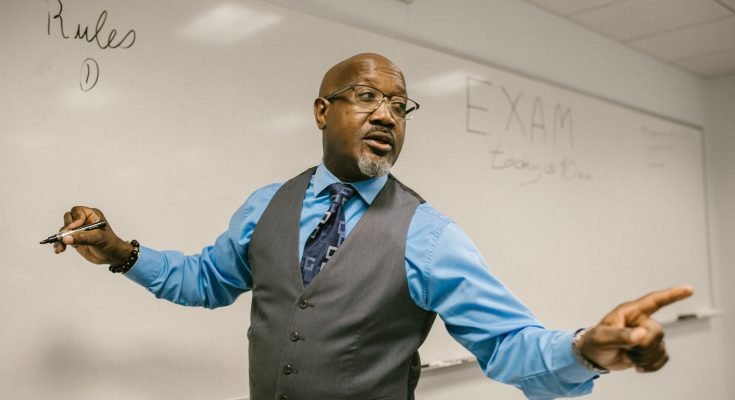Teaching is an incredibly rewarding career that impacts the lives of students every single day. However, earning a master’s degree can be a significant financial investment. The good news is that there are numerous scholarship opportunities available to help fund your graduate studies and further your teaching career.
Why Pursue a Master’s in Teaching?
Before exploring specific scholarship options, it’s important to understand the value of continuing your education at the graduate level. Earning a master’s degree provides several important benefits for teachers:
- Increased salary potential. Most school districts offer higher pay scales for teachers with master’s degrees. On average, a teaching salary with a master’s is 5-15% higher than with just a bachelor’s.
- Expanded career opportunities. A master’s can open the door to leadership roles like curriculum coordinator, instructional coach, or administrator. It’s often required for these advanced teaching positions.
- Specialized expertise. Focusing your master’s studies in an area like special education, reading specialist, STEM, or educational technology allows you to develop advanced skills and qualifications in high-need teaching fields.
- Continued learning and growth. A graduate program keeps you engaged as a lifelong learner and helps you stay current on emerging teaching practices and educational research. It reinforces your commitment to student achievement.
For any teacher passionate about positively impacting students, the career and learning benefits of a master’s degree make it well worth the investment. Financial assistance in the form of scholarships can help make that investment more manageable.
When to Begin Your Scholarship Search
The ideal time to begin researching and applying for scholarships is 6-12 months before your intended enrollment date in a master’s in teaching program. Some key dates and deadlines to be aware of include:
- Fall 2024 enrollment: Start your search no later than spring 2023. Many deadlines will be in late 2023.
- Spring/Summer 2024 enrollment: Begin no later than fall 2023 with deadlines spanning late 2023-early 2024.
- National/federal scholarships: These awards often have earlier deadlines, sometimes over a year in advance, so factor them into your timeline.
- Institutional scholarships: Contact the education departments and financial aid offices at schools you’re considering for internal deadline information and to stay updated on new award opportunities.
Taking time to thoroughly search both national/federal sources as well as at the college/university level will vastly improve your chances of obtaining scholarship funds. Don’t wait until the last minute – start early!
Where to Search for Scholarships
There is no single comprehensive database of all possible scholarships available, so you’ll need to explore multiple potential sources. Here are some of the top places to uncover funding opportunities:
National/Federal Scholarship Databases
- Fastweb.com: One of the largest free scholarship search engines, Fastweb connects you to both private and government awards.
- Scholarships.com: Another robust free database that filters results specifically by academic level, major, state, and other criteria relevant to education scholarships.
- Federal Student Aid: The official U.S. government site provides information on federal grants, loans, and scholarships like the TEACH Grant.
College and University Websites
- Review the financial aid pages and education department sites at schools you’re applying to for campus-specific scholarships.
- Search individual state education agencies – many states offer awards for aspiring or current public school teachers within their borders.
Professional Organizations
- Groups such as the American Federation of Teachers, National Education Association, National Science Teachers Association, etc. provide member scholarships.
- Subject/content area associations also have awards like the Council for Exceptional Children or the National Council of Teachers of English.
External Private Scholarship Programs
Explore external foundations, non-profits, companies, and other organizations that focus specifically on supporting education students and teachers through dedicated scholarship programs.
With diligence across these categories of funding resources, you’ll find many fitting scholarship opportunities to explore applying for. It’s wise to apply to as many relevant awards as possible to maximize your financial outcome.
Scholarship Application Process
Now that you’ve identified scholarships of interest from your multi-faceted search, it’s time to prepare solid applications. Most will require similar core components:
- Personal statement: Introduce yourself, your teaching path and values, and future teaching goals. Emphasize any selection criteria. 500-1000 words.
- Resume: Highlight your education, relevant experiences like student teaching or substitute teaching, skills, and accomplishments.
- Transcripts: Submit official copies from all institutions of higher education attended.
- References: Provide 2-3 professional or academic references who can speak to your strengths and qualifications.
- Essay question: Answer a prompt specific to the award – why you should be selected, your dedication to education, plans to give back to the community, etc.
Thoroughly follow all instructions and give yourself time for proofreading. Ask people to review your materials. Many deadlines are in the fall, so apply early in the application period. Submitting quality, error-free applications will serve you well in the review process.
Scholarships for Diverse and Underrepresented Students
In addition to searching broadly through the previously outlined channels, it’s worth exploring specific funding opportunities targeted toward supporting more diverse and underrepresented students in teaching. Examples include:
- Scholarships for male teachers or teachers of color
through organizations like Call Me MISTER or The Broader Vision. - First-generation student scholarships such as the Stupski Foundation or Jack Kent Cooke Foundation awards.
- Scholarships for bilingual/ESL teachers or future teachers with disabilities like the Council for Exceptional Children awards.
- Place-based scholarships focused on aspiring teachers from rural communities or aiming to teach high-need subject areas.
If you identify with an underrepresented group, doing extra research on diversity-focused scholarships could uncover valuable supplemental funding options that match your unique experiences and goals. Making diversity a priority, these programs help support equitable access to educational opportunities.
Tips for Supporting Your Scholarship Applications
To strengthen your candidacy and make the most competitive case possible, consider the following extra tips to support your scholarship application materials:
- Ask recommenders to specifically comment on your qualities that relate to the award criteria in their letters.
- Highlight statistics on teacher shortages to frame why your content area or teaching population is in demand.
- Discuss your plans to promote diversity, equity, and inclusion as an educator wherever relevant.
- List any academic honors received, leadership roles held, or GPA if it is competitive.
- Engage in volunteer work, student organizations, or research related to your future teaching field.
- Pursue specialized credentials like ESL or reading endorsement that add to your qualifications.
- Frame obstacles or challenges overcome on your path to further education and teaching.
The more thoroughly you can convey your motivation to teach, passion for education, and fit with the sponsor’s mission, the better positioned you’ll be. Pursuing extra credentials and experiences specially tailored to specific award criteria gives a competitive advantage.
Notifying Scholarship Sponsors of Intent to Accept
If selected for an award, you will need to formally notify the sponsor that you plan to accept the scholarship funds. This ensures the money is held for you and not offered to another applicant. Typically you will be provided a brief time frame, such as 2-4 weeks, to respond to a scholarship acceptance letter with your notice of intent. Some key points to remember include:
- Respond promptly in writing by the deadline stated. Email response is usually acceptable.
- Express sincere gratitude for being selected.
- Re-affirm your commitment to the terms of the award, such as choice of institution or educational program.
- Provide any other required documentation like enrolling certification or proof of registration at your chosen college.
- Save copies of all your correspondence for your financial aid records.
Following up in a timely, professional manner demonstrates your appreciation and confirms you plan to utilize the scholarship as intended. This final piece ensures a smooth transition to receiving the funding.
Tips for Scholarship Renewal
Some scholarships may be renewable for multiple years if you meet the specified renewal criteria. To maintain eligibility, you’ll need to abide by any stipulations outlined by the sponsor, which typically involve:
- Maintaining the required minimum GPA, usually 3.0 or higher.
- Continuing full-time enrollment in your approved program of study.
- Submitting renewal application materials by published deadlines.
- Potentially requiring a renewed letter of support or recommendation.
- Providing proof of progress towards degree like transcripts of completed coursework.
Be sure to carefully retain correspondence about renewal policies. Mark your calendar with application due dates. Prepare materials early, emphasizing ongoing achievements. Treat each renewal as seriously as your initial application for the best chance at continued funding support. This allows scholarships to cover costs beyond just one academic year.
Frequently Asked Questions
Here are answers to some of the most common questions about scholarships for a master’s in teaching:
Do I need to be enrolled in a program already to apply for scholarships?
Many scholarships will require proof of acceptance and enrollment at an eligible university or college in order to receive the award funds. However, there are also options like national scholarship searches that you can apply for prior to being admitted. Focus on fully accredited teaching programs when exploring eligibility requirements.
Are scholarships only for full-time students?
While many larger, more competitive scholarships stipulate full-time enrollment of at least 9 credits per semester, there are also some opportunities available for part-time or distance learning students. Be sure to thoroughly vet any funding source’s enrollment criteria to see if they accommodate alternative academic schedules.
What if I need help paying for expenses beyond tuition?
While the primary purpose of most scholarships is to pay tuition and academic program fees directly, some may permit a portion of their award amounts to be used for additional education-related costs like textbooks, room, and board for campus residents, or student teaching expenses. Carefully read all policies and correspondence to know allowable uses for particular scholarship funding.
When will I receive scholarship disbursements?
Payment schedules are outlined in the terms and conditions of each scholarship. Common patterns involve receiving award money in multiple disbursements throughout the academic year or semester. Funds are usually paid directly to your student account and applied toward your balance first before any potential leftover amounts are refunded to you. Keep close contact with your university’s financial aid office.
Do grades/GPA affect continuing scholarship eligibility?
Yes, maintaining satisfactory academic progress is usually one of the primary requirements to both initially earn and annually renew most competitive scholarships. This commonly means keeping a minimum cumulative GPA between 3.0 and 3.5. Be sure to understand any ramifications if your marks slip below the standard set forth in your scholarship contract.



